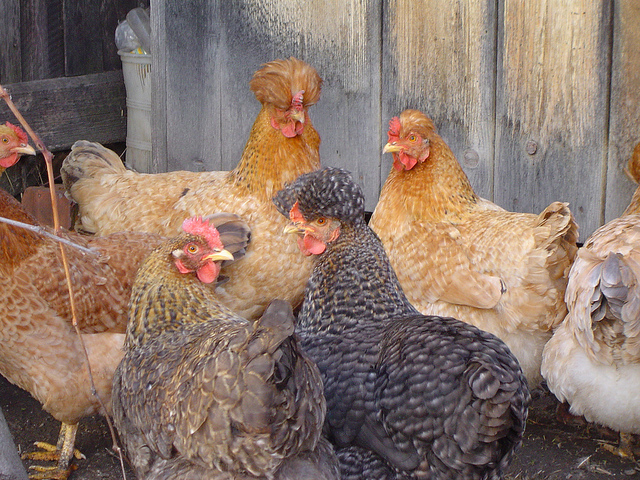
When you have successfully established your own small flock of chickens in your backyard, you will have covered all the basics, from feeding and watering, to housing space, to predator and weather protection. Now, your original flock has grown from 3 to 20, and your home has more eggs than it can handle in a week. How do you deal with the increasing surplus? Easy. You make some money off them.
By now, you know how fulfilling it is to be raising animals for food for your household with your own hands. You know there is nothing like naturally grown, organic eggs and chicken meat fresh from your own backyard in terms of taste and quality. This could actually be your marketing pitch when you begin making a small side business out of your chickens.
Eggs for Extra Cash
If you love your ladies to death and hate to see them off to an abattoir, your best bet in generating some income is their eggs. When a hen comes into egg-laying maturity, you can expect her to give you 5 to 6 eggs a week until throughout her first year of egg production. If you’ve got, say 20 hens in your coops, you can have up to 10 dozen eggs a week. That’s actually a great start. If your home only needs a weekly ration of a dozen eggs, then you can sell off the remaining 9 dozen for profit. Not bad for a side business.
Find Out Prevailing Egg Prices
Like any entrepreneur would, you need to check out the prevailing prices for eggs in the local shops or of your neighbor, if they’re also selling. You can sell at a lower price than the supermarkets. However, if you know your eggs’ worth, like if you can certify them organic (free of commercial feeds and antibiotics, etc.) and you know your backyard yields good-quality eggs, you might be able to command a better price. If you’re not sure and to be safe though, it’s best to start out modestly.
You can check out how egg suppliers get their eggs around in your locale and perhaps make use of the same means of getting your own eggs on store shelves. You can try bakeries, meat shops, and supermarkets. If not, you can always sell door-to-door or from your gate.
Maintain High-Quality Eggs
To keep eggs at a commercial level or better, you need to keep your cluckers in top condition by providing them wholesome feed, clean water, and optimal housing conditions. Chickens do need to be provided about a bowl of fine bits of stone, like in sand and grit, to aid their digestion. In providing their grit ration, you can also mix in some amount of ground oyster shells to up their calcium intake. This is great for promoting strong eggshells.
An important point you should know: hens taper off in egg production on their second year of egg laying. That means they could then lay fewer than 5 to 6 eggs a week. If you want to continue keeping them around at this point and beyond, that’s just fine. If you also need the business the eggs bring though, you will have to weigh your options on this one, especially if you have space and money constraints.
If you have a rooster or two around, you can probably keep some of your hens for breeding and increasing your flock. Even then, you will have to consider selling your less productive chickens off for meat – which brings us to the next point.
Chicken Meat for Money
Raising chickens is also a great way of filling the freezer with food and making some money off the extra. If you’re not overly attached to your chickens or are not seriously regarding them as your feathered companions (complete with names), then selling them for meat is another moneymaking option for you.
If you’re raising hens for meat, especially after their egg-laying prime, you can feed them with higher-protein crumbles at 22% to 24% protein content, or keep them on your preferred chicken diet just with a higher protein component. Medicated feed is always optional, especially if you’re keen on keeping it all-natural and organic with your chickens. However, if you’re doing the medicated feed option, you will need to stop giving it at least two weeks before sending your chickens to the butcher.
Costs to Consider
As you begin to consider the moneymaking aspect of raising chickens, you will also start figuring out what kind of money you can expect to make. You can begin doing so by working out your fixed and variable costs. The variable costs are the expenses you take on per bird, which will depend on each bird’s life stage, as well as on their level of health. Variable costs include feed, processing at the abattoir, and medication, when needed. The fixed costs are associated with the equipment and tools that can be re-used batch after batch of chickens. These include coops or tractors, feeders and waterers, and fencing equipment.
Take time to figure out how much you will have to expend for feeds to produce a typical market weight 5 lbs. per bird. The feed conversion (or how much feed you will need to grow a chicken to a certain weight) most chicken raisers use is 5:1. This means you will need 5 lbs. of feed to grow 1 lb. of chicken. From there you can figure out your costs depending on the prices of the feeds you use.
Now that you know that raising chickens is a breeze, learning how to make a profit from them is but a natural next step. Whether you just intend to sell the surplus or eventually launch into a large-scale undertaking, learning the business basics will help you make a quick buck, well, quicker.














